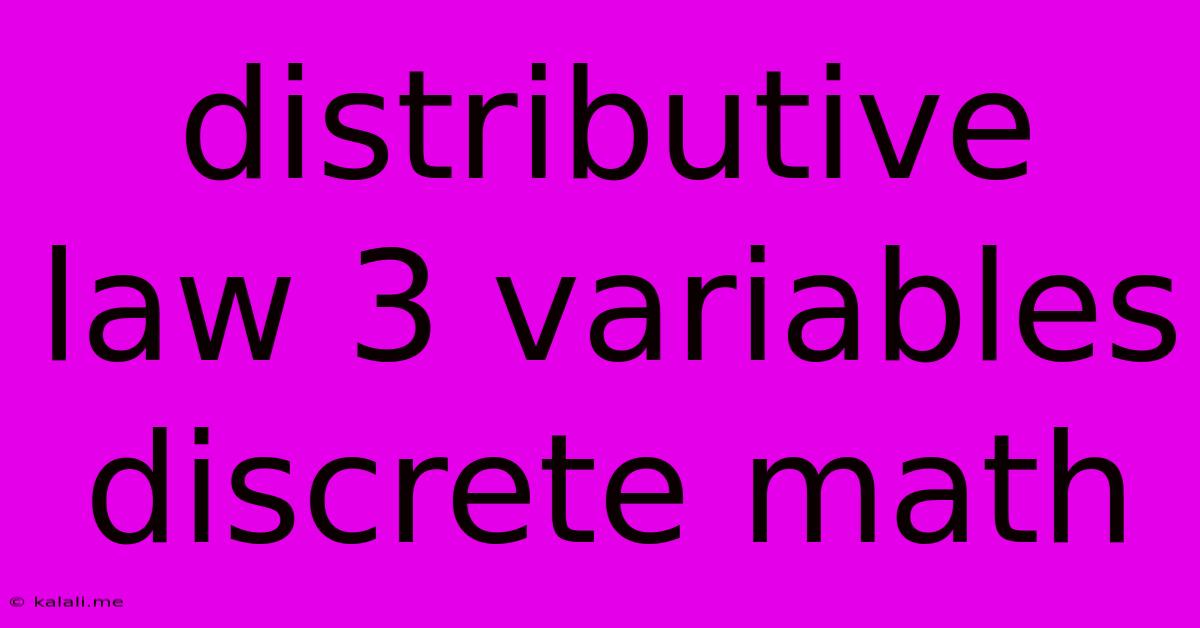Distributive Law 3 Variables Discrete Math
Kalali
May 23, 2025 · 3 min read

Table of Contents
Understanding the Distributive Law with Three Variables in Discrete Mathematics
The distributive law is a fundamental concept in algebra and discrete mathematics, governing how multiplication interacts with addition. While often introduced with two variables, understanding its extension to three or more variables is crucial for more complex mathematical operations. This article will explore the distributive law involving three variables, illustrating its application and importance in discrete mathematics. We'll also look at how it applies to different number systems.
What is the Distributive Law?
The distributive law states that multiplication distributes over addition. In its simplest form (with two variables), it's expressed as: a(b + c) = ab + ac. This means that multiplying a number by a sum is the same as multiplying the number by each term in the sum and then adding the results.
Extending the Distributive Law to Three Variables
Extending this principle to three variables is straightforward. Consider the expression a(b + c + d). Applying the distributive law, we get:
a(b + c + d) = ab + ac + ad
This demonstrates that the multiplication by 'a' distributes over each term within the parentheses. The same principle applies regardless of the number of terms inside the parentheses.
Examples of the Distributive Law with Three Variables
Let's illustrate this with a few examples:
-
Example 1: 5(2 + 3 + 4) = 5(2) + 5(3) + 5(4) = 10 + 15 + 20 = 45
-
Example 2: x(y + z + 1) = xy + xz + x
-
Example 3: (2x + 1)(x + y + z) = (2x)(x) + (2x)(y) + (2x)(z) + (1)(x) + (1)(y) + (1)(z) = 2x² + 2xy + 2xz + x + y + z
These examples showcase how the distributive law simplifies expressions involving both numbers and variables.
Application in Boolean Algebra
The distributive law isn't limited to standard arithmetic; it also plays a vital role in Boolean algebra, a branch of discrete mathematics dealing with logical operations. In Boolean algebra, the '+' symbol represents the logical OR operation, and the '*' symbol (often omitted) represents the logical AND operation. The distributive law remains the same:
A * (B + C) = (A * B) + (A * C)
Importance in Discrete Mathematics
The distributive law is a fundamental tool for simplifying and manipulating algebraic expressions. This is crucial in various areas of discrete mathematics, including:
-
Simplification of logical expressions: In circuit design and computer science, simplifying Boolean expressions using the distributive law leads to more efficient and less complex circuits.
-
Solving equations: The distributive law is often used to solve equations and inequalities involving multiple variables.
-
Proofs and theorems: The distributive law serves as a foundation for many proofs and theorems in abstract algebra and other areas.
Conclusion
The distributive law, even when extended to three or more variables, remains a cornerstone of algebraic manipulation. Understanding its application across different mathematical systems, including standard arithmetic and Boolean algebra, is vital for anyone working with discrete mathematics. Mastering this concept simplifies complex expressions, solves equations efficiently, and forms the basis for understanding more advanced mathematical concepts. Remember, consistent practice with varied examples will solidify your understanding of this crucial law.
Latest Posts
Latest Posts
-
How Many Grams Of Sugar In A Pound
Jul 12, 2025
-
7am To 11am Is How Many Hours
Jul 12, 2025
-
If Your 35 What Year Was You Born
Jul 12, 2025
-
How Many Cups Is 1 Pound Of Cheese
Jul 12, 2025
-
30 X 30 Is How Many Square Feet
Jul 12, 2025
Related Post
Thank you for visiting our website which covers about Distributive Law 3 Variables Discrete Math . We hope the information provided has been useful to you. Feel free to contact us if you have any questions or need further assistance. See you next time and don't miss to bookmark.